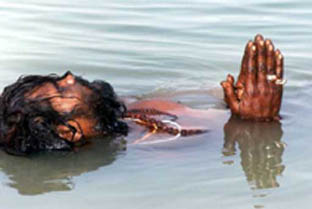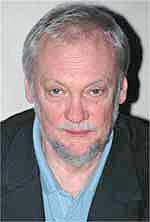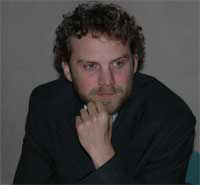SWEDISH SOUTH ASIAN STUDIES NETWORK
 Division
of Comparative Religion; Department of Ethnology, Comparative Religion
and Gender Studies, Stockholm University:
Division
of Comparative Religion; Department of Ethnology, Comparative Religion
and Gender Studies, Stockholm University:
Postal address: Stockholms universitet, Religionshistoriska avdelningen, Institutionen för etnologi, religionshistoria och genusstudier, SE-106 91 Stockholm, Swden
Visiting address: Universitetsvägen 10 E (E Block, 3rd floor),
Frescati
Web page: http://www.su.se/pub/jsp/polopoly.jsp?d=7610
Contact person: Professor Per-Arne Berglie, Head of Department, phone: +46 (0)8 16 33 36
South Asia related research at the department:
Associate Professor Erik
af Edholm has been one of Sweden’s leading
scholars on Hinduism and South Asia since several decades. As
associate professor at the Dept of Comparative Religion he has
been engaged in research on different aspects of religion in
South Asia: Saivism and Vaisnavism in South India; Myth; Hagiography;
Theology; Agamic ritual, Iconography and Temple Architecture – especially
in the Tamil area; Early reception of Indian Religion in Sweden;
and Classical Indian interpretations (epistomologies) of trance
experience (Yogipratyaksa, Jnanacaksus etc) in Indian religion;
and Sandesakavya texts from South India. He defended his doctoral
dissertation titled ”Jnancaksus. On
Vision and Knowledge in Indian Religious Thought” at Uppsala
University in 1989. In the thesis, Erik af Edholm examines some
interrelated themes in Hindu, Buddhist and Jaina traditions.
These parallel systems of thought share a number of concepts
which once belonged to the pre-classical traditions of ascetic
and sramanic circles and were closely connected with the cultivation
of visionary experience.
Since the 1970’s he has
also written a large number of books and articles on Hinduism and India,
e g in the magazine Orientaliska
Studier.
Professor Per-Arne
Berglie defended his doctoral dissertation on ”The
Gods climb down. Ritual obsession among Sherpas and Tibetans”
in 1983. His main interest is Buddhism and especially the phenomena of
ritual possession in Buddhist contexts, and the thesis was a study
of the beliefs and practices of some Sherpa and Tibetan spirit-mediums
in Nepal. The research was carried out in Nepal during the period 1970-71.
The primary aim of the thesis was to put material for the study of Tibetan
folk religion at the disposal of scholars. An article about the subject,
titled ”Preliminary Remarks on Some Tibetan ‘Spirit-mediums’ in
Nepal” was published in the magazine Kailash 1976, issue no 4.
Read
the article (as a pdf-file).
He has later conducted fieldwork
in Taiwan, Vietnam, Burma and among Tibetans in Nepal. His latest publications
include “Shamanic
Buddhism in Burmese Spirit Medium Rituals".
 Dr. Urban
Hammar (photo to the left) defended his doctoral
dissertation thesis on ”Studies in
the Kalacakra Tantra: A History of the Kalacakra in Tibet and a Study
of the Concept of Adibuddha, the Fourth Body of the Buddha and the Supreme
Unchanging”, based on texts in Tibetan and Sanskrit,
and including research work among the Tibetan community in India, on Friday
27 May 2005. Faculty opponent was John Newman, New College of Florida,
USA. The thesis treats the the tantric Buddhist system of teachings of
Kalacakra, today a well-known teaching and initiation given since 1970
by the present Dalai Lama at mass ceremonies around the world. The Kalacakra
was first introduced by Bhadrabodhi and Gyi-jo in the eleventh century,
another example of successful cooperation between an Indian pandit and
a Tibetan translator. More
information, including abstract.
Dr. Urban
Hammar (photo to the left) defended his doctoral
dissertation thesis on ”Studies in
the Kalacakra Tantra: A History of the Kalacakra in Tibet and a Study
of the Concept of Adibuddha, the Fourth Body of the Buddha and the Supreme
Unchanging”, based on texts in Tibetan and Sanskrit,
and including research work among the Tibetan community in India, on Friday
27 May 2005. Faculty opponent was John Newman, New College of Florida,
USA. The thesis treats the the tantric Buddhist system of teachings of
Kalacakra, today a well-known teaching and initiation given since 1970
by the present Dalai Lama at mass ceremonies around the world. The Kalacakra
was first introduced by Bhadrabodhi and Gyi-jo in the eleventh century,
another example of successful cooperation between an Indian pandit and
a Tibetan translator. More
information, including abstract.
Dr. Hammar is now connected to the Forum for South and Central Asian Studies (ForSCASS), Department of
Oriental Languages; Stockholm University, where he teaches Tibetan. ![]()
Dr. Pavel Volf defended his doctoral thesis at the department in 1994 on ”Victory to the Gods. Ritual obsession among Ladakhis”. He is now teaching in the department.
 PhD
candidate Klas
Nevrin (photo to the right) is working on a doctoral
dissertation on Hindu Yoga traditions
since the Spring 2004. It is a comparative study of modern and historical
forms of yoga which focuses on the Viniyoga tradition. Views of body,
health, ritualization, and relation between text and practice are studied
using a primarily hermeneutic-phenomenological approach. Both textual
sources and anthropological material are emphasized.
PhD
candidate Klas
Nevrin (photo to the right) is working on a doctoral
dissertation on Hindu Yoga traditions
since the Spring 2004. It is a comparative study of modern and historical
forms of yoga which focuses on the Viniyoga tradition. Views of body,
health, ritualization, and relation between text and practice are studied
using a primarily hermeneutic-phenomenological approach. Both textual
sources and anthropological material are emphasized.
Project abstract: The use of chant and recitation is
rapidly becoming an important feature in many religious settings, most
notably in several modern Yoga traditions, yet the phenomenon has received
less attention in research studies on contemporary religions. This paper
is. work in progress that will draw attention to the dimensions of aurality
and orality in ritual theory. The paper will investigate the usefulness
of various performance and body-oriented approaches in an attempt
to understand oral performances of Yogasutra in the Viniyoga tradition. These
approaches are considered relevant because in many ways the dimensions
of aurality and orality, as evinced in recitation, destabilize a rigid
mind-body discontinuity, and may be seen as a significant part
of the endeavour to destabilize dichotomies that are otherwise common
in studies on the ritual use of texts. Recitation is also discussed in
terms of (a) various modes of reception and interpretation of texts, such
as informative, performative and transformative; (b) "flow"
and "deep play"; and (c) so-called "gnoseological hermeneutics".
The resulting tentative framework of the analysis draws attention
to tensions and subtleties in the relationship between meditation, ritual,
and scholastic study.
PhD candidate Stefan
Larsson is working on a project titled ”Sacred
Madmen in Tibetan Buddhism”. It deals with a Tibetan Buddhist
guru in the 15th Centrury AD, named gTsang smyon Heruka (1452-1507).
This guru was considered to be a ”sacred
madman”,
a concept prevalent in Tibetan tradition.
A student at the D-level course, Hedda Jansson, was present at SASNET’s symposium for PhD candidates in October 2002: who later pursued research on Buddhism in the Kathmandu Valley, Nepal.
Earlier doctoral dissertations related to South Asia:
Per Juliusson defended a doctoral thesis at the department in 1974 on ”The Gonds and their Religion. A study of the integrative function of religion in a present, preliterary and preindustrial culture in Madhya Pradesh, India”. Dr. Juliusson worked for the organisation EFS as a missionary in India, and later became a vicar in the Swedish Church. He passed away in 1978.
Jan Samuelsson was an Islamologist who defended his doctoral thesis at the department in 1975 on ”Islam in Afghanistan – under the leadership of King Muhammed Zahir Shah. A study of the modernization process and its implications for the role of Islam in Afghanistan”. Dr. Samuelsson has later written several Swedish language books within the field of Islamology, a book about Love and Family life in 1996, about Islamic Economy in 2000 (read a review of the book), and in 2001 a book about Islamic Medicine (read a review of this book). He was also very active in the public debate in Sweden, and participated actively in board for the Swedish Committee for Afghanistan. Jan Samuelsson passed away in December 2005.
SASNET - Swedish South Asian Studies Network/Lund
University
Address: Scheelevägen 15 D, SE-223 70 Lund, Sweden
Phone: +46 46 222 73 40
Webmaster: Lars Eklund
Last updated
2010-11-18
